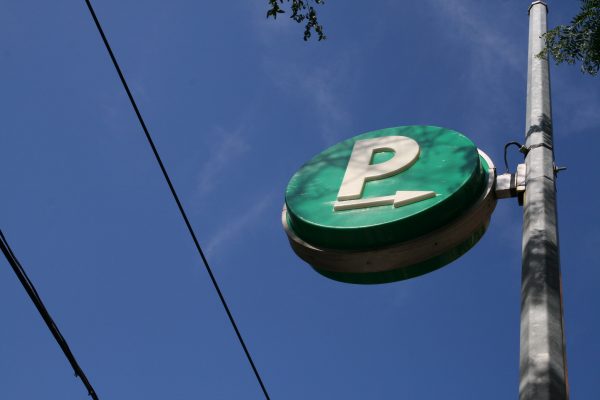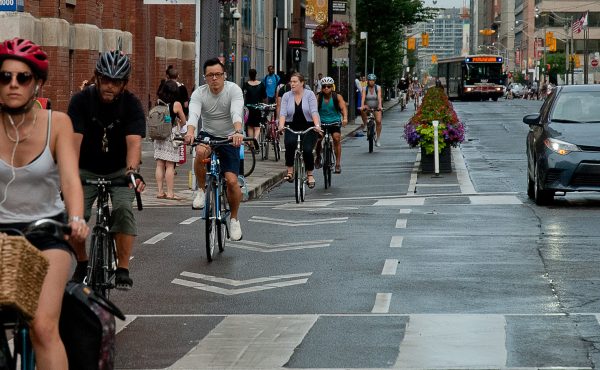Can anyone who pays attention to City Hall say they didn’t see this one coming?
The latest news from the budget committee’s deliberations is that the City’s proposed fees for CafeTO may be high enough to kill off the popular program. The pilot-now-permanent-but-soon-to-be-DOA program had been operating in a state of fee-free bliss for these past two years. Yet CafeTO must finally submit to the perverse impulses of a municipal administration that punishes what’s good for public space and rewards that which is not.
Case in point, also from this year’s budget fest: a discouraging memo from the city’s finance staff, enumerating the myriad difficulties and short-comings associated with establishing a parking levy. And this from a municipal government that, by its own admission, can no longer come close to balancing its books.
There’s been chatter about a parking levy in recent weeks, with advocacy groups like TTC Riders and downtown councillor Chris Moise connecting all the policy dots that should be connected, e.g., how such a levy would discourage driving, encourage transit use, off-set the need for a TTC fare hike, and on and on.
Ever since the American planner Donald Shoup published his seminal work, “The High Cost of Free Parking,” back in 2005, there’s been a spirited and expanding debate about the dubious role that parking plays in the urban context. Shoup argued that the prices for main street parking should be set by the market, municipalities should re-invest the revenues in local improvements, and that the city shouldn’t go out of its way to provide parking off main streets.
Others documented the ways in which low income or property taxes on parking lots could inadvertently trigger the demolition of older buildings that struggled to find tenants — a dynamic that was very much in play in downtown Toronto in the 1960s and 1970s, and persists to this day in places like Ottawa.
The policy debate over parking has dovetailed with the push in many places to implement the various approaches to road pricing (congestion charges, tolls, etc.). For a brief shining moment back in 2020, those advocating for temporary curb-side patios succeeded in persuading the city that the daily revenues from even a middling CafeTO location far exceeded the funds generated by the street parking spaces it replaced.
However, this lonely exception merely proved the rule, which is that Toronto doesn’t do any kind of road pricing, including parking levies, which are permitted as a new revenue tool under the City of Toronto Act, and nonetheless languish, unused either as a cash generator or a policy instrument, on the island of misfit taxes.
Mayor John Tory has been quick to throw cold water on the idea. Parking levies, he said this week, “have plenty of complexities which just don’t make it an easy thing to do. And that’s not the responsible way to run the government. And I won’t run the government that way.”
His comment is obviously political: Tory and council’s right know that their constituents don’t want to pay to park at the shopping mall; they also know that the handful of gigantic pension funds and asset managers that own so much of Toronto’s blacktop wouldn’t be thrilled, either.
But the politicians barely need to get off the couch to express these views because the city’s finance staff are more than happy to supply all the negative information they could possibly want. The five-page budget briefing note on a parking levy is a veritable study in how to make sure an idea never makes it to the floor of council. The document is chock-a-block with grave cautions about long implementation times, endless requests for exemptions, and computational complexities, as well as dated warnings (from a 2016 KPMG report) that even if council goes to the trouble of implementing said levy, it won’t produce much green.
What’s missing from the document is any analysis beyond the financial — how a parking levy might help the city achieve its climate goals (lest anyone forget that council declared a climate emergency a few years back), enhance public space, or drive up ridership on the TTC.
Nor would readers — i.e., councillors on the budget committee and the geekier members of the general public — know that parking levies are commonplace in many other major cities. It’s not like we’re designing a new type of space ship.
Here are but a few of the examples I found without much effort:
- Melbourne, Australia, where a parking levy applies to off-street private and public parking spaces across parts of the inner city.
- Scotland, where a law passed last year allows municipalities to impose an annual tax on parking spaces provided by employers. Edinburgh is considering one to discourage people from driving to work.
- Manhattan, where the city charges a parking tax of more than 18% on rented spaces.
- London, U.K., which uses “workplace parking levies.” I’ll let Transport for London explain the rationale: “WPLs are used to encourage commuters to switch away from using private vehicles to get to work or school – this will help us meet the Mayor’s aim that 80% of trips in London be made by walking, cycling or by public transport by 2041. The revenue raised will be spent on improving local transport.”
- San Francisco, California, where the city treasurer imposes a 25% tax on all off-street parking.
- Montreal, Quebec, which imposed a parking lot tax in 2010 for parking spaces in non-residential buildings, and is applied variably in different parts of the city.
While council did make a significant move last year by eliminating parking minimums on new developments, the City remains defiantly out of step not just with climate aware policy making, but its own fiscal sustainability, Tory’s protestations to the contrary. Put another way, officialdom’s disdain for a parking levy reads like a doubling down of the self-destructive behaviour on the part of the one institution best positioned to drive, if you pardon the pun, carbon reduction in the sector — transportation — that produces the most of it.
With apologies to Nero, we’re fiddling — or, more precisely, looking for a cheap parking spot — while Rome burns.






3 comments
Too bad the City’s Finance’s staff’s enthusiasm for killing a parking tax doesn’t extend to arguing against TTC fare increases and Development Charges on affordable rental housing projects. The sooner the City’s Finance Department is obligated to have regard for the intent and polices and of the City of Toronto Official Plan, the better off Toronto will be.
Lets start with placing Development Finance into the City Planning Department and see where it takes us.
Toronto’s Green P was created in the 1950’s. At the time, they actually wanted people to drive downtown, so they charged parking to be LOWER than the commercial lots. Basically, SUBSIDIZING the drivers from outside of the city to park.
We no longer want that. Instead, we should be converting the Green P into delivery zones for delivery trucks. Maybe free for the first 15 minutes for delivery or loading only.
In fairness to “the memo” it does state clearly “In addition to potentially providing a dedicated revenue stream for transit and climate initiatives, a parking levy may encourage operators to change the use of under-valued and under used spaces, and shift consumer habits to use public transport due to increased parking fees.” The rest just states that there will be a l;ot of things to figure out. Which is true. Doable for sure.